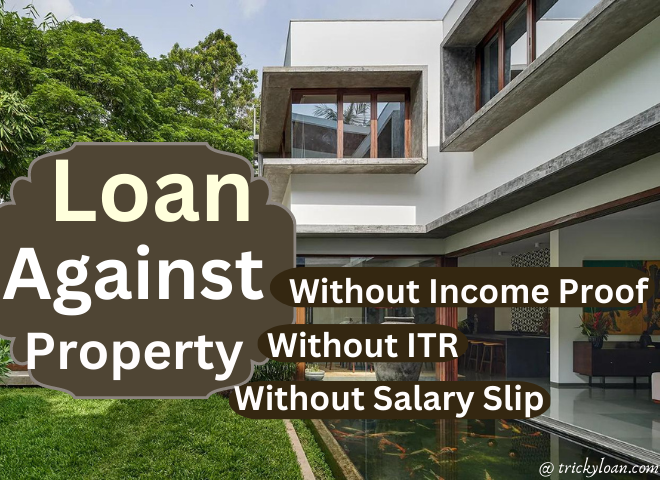A Loan Against Property is a secured loan in which the borrower mortgages his residential / commercial / industrial property to the lender and obtains the fund / loan. Generally, There is no restriction on the use of funds in loans on property. The borrower can use the loan for a variety of purposes such as Business Expansion, Medical Emergency, wedding, Further Education etc.
Features of a Loan against Property
- A Loan against property is available to all Salaried, Professional, Business Owner and Registered Company.
- Funds received via a Loan against property can be used for Personal and business usage.
- Loan amounts that are granted for a Loan against Property start from 5 Lacs up to 200 crores taking into account the value of the property and the income of the applicant.
- The repayment tenure allowed for a Loan against property is a maximum of 15 years.
- LTV of the Property Loan is 60% – 75% of the current market value of the mortgaged property.
Eligibility Criteria for Loan Against Property
- The age of the Applicant & Co-Applicant must be between 18 and 70 years.
- Minimum monthly income should be Rs.25000./-
- To be eligible for a mortgage the property should be self owned and registered under the name of the applicant if jointly owned by family members or company, all owners will have to be included in the loan as Co-Applicants.
- The work experience required for a salaried applicant is 2 years or more to apply. The salary should be transferred through ECS or a cheque deposit, salary received in cash will not be eligible.
- Income received from pension, rent can be added to the total earning for eligibility, with valid proof of the same.
- The applicant or borrower should be comfortable to pay the monthly EMI taking into account the monthly expenditures and other obligations including loans and credit card outstanding.
- Loan Against Property is issued to Sole Proprietors, Partnership Firms, LLP, Pvt. Ltd and Ltd. Company.
- The turnover for the business should be a progressive one; there should be no dip in income from the business for the past two financial years and for the projected year ahead.
- The banking of the firm should be healthy with no bounces or cheque returns: other loans and obligations will be taken into account when finalizing eligibility for loan amount.
- Industry should be approved as per the norms of the Bank/NBFC. Facility for mortgage will not be provided for a business that is considered as a negative profile.
- The entity should be in existence for a minimum of 3 years or more with a positive net worth and a minimum return of 3 lakhs and above.
Advantages of a Loan Against Property
Financial necessity remains in daily life. Whether it is to meet worldly needs, expand your business or for an emergency, mortgaging your property is a good solution to easily obtain funds.
The rate of interest applicable on a mortgage loan is second only to that of a home loan. Being a secured loan, a minimum interest rate is charged as compared to other available loans.
It can be worth the time to get a loan against property when the requirement is for an increased loan amount, as the repayment period for the loan against property is up to 15 years. Therefore the loan can be repaid easily, with a suitable EMI which is easily affordable for the applicant or borrower. The income of a family member as a co-applicant can be clubbed together to obtain the required loan amount.
The documentation required to process the loan on the property is simple and easily available. With the completion of the required documents, it takes 10 to 15 days for the loan to be processed on the property. Thus funds are available at the fastest turnaround time when you need them.
Loan Against Freehold Property
Generally all Banks / HFCs /NBFCs are willing to provide Mortgage Loan Against Freehold Property. This is because it is considered a safe investment. Not only the registration of freehold property is done but the expectation of an increase in its value is very high.
Loan Against Leasehold Property
Taking a Mortgage Loan Against Leasehold Property is not a very difficult task. Almost all Banks / HFCs /NBFCs offer Mortgage Loan on Leasehold Property with specific terms and conditions (i.e. PTM).
Loan Against Commercial Property
Mortgage Loan Against Commercial Property generally take over where business loans finish. It usually lasts from three to 15 years and you can usually find a 60-70% mortgage. This is a measure of loan-to-value ratio to see how much you are borrowing in relation to how much the property is worth.
Loan Against Industrial Property
Lenders including Banks/HFCs/NBFCs offer Mortgage Loan Against Industrial Property by mortgaging a manufacturing unit located in any industrial areas in the country. An industrial property can be a Manufacturing Unit, Industrial Land, Workshop or any other type of property in a defined Industrial zone, owners of a manufacturing unit or workshop can take Mortgage Loan Against Industrial Property by offering the industrial property as a collateral security.
Loan Against Lal Dora Property
Most Banks and HFCs reject mortgage loan applications against Lal Dora Property. But, this is not the end of the root for applicants residing in these villages. To meet the increasing demand for Mortgage loans in the Lal Dora region, some HFCs or NBFCs have come forward to offer Mortgage Loan Against Lal Dora property with certain special terms and conditions.
Loan Against GPA Property
A Mortgage Loan Against GPA Property is a type of Secured Loan where a applicant avail funds by providing his GPA Property as collateral to the Banks/HFCs/NBFCs. There are HFCs/NBFCs which provide financial assistance or Loan against GPA (General Power of Attorney) Property with some special terms and conditions. (I.e. – Subject to Sale Deed / Subject to Gift Deed or Subject to Registered Mortgage).
Transferring ownership through GPA is also very popular in Gurgaon, Faridabad, Noida, Greater Noida and Ghaziabad. Few HFCs/NBFCs provides mortgage loan against GPA Property in Gurgaon , Faridabad, Ghaziabad, Noida and Greater Noida also.
Loan Against Gram Panchayat Property / Agricultural Land
Most of the land in the village area is “Pustaini” or “Dadalai” due to which there is no Sale Deed available. Banks /HFCs / NBFCs demand property documents to secure their loans, which the villagers do not have. The property documents/land documents of the villagers is in the form of “Farad” or “Khasra-Khatouni”.
Therefore private HFCs/NBFCs do not provide loan on the property of the village. But, if the income of the applicant is good, then the nearest Bank provides the loan with some terms and conditions (l.e. mortgage entry in Farad). These banks are – State Bank of India, Bank of Baroda, Punjab National Bank, Bank of Maharashtra, Central Bank of India etc
Loan Against Plot or Plot Registry
Generally, All Banks / HFCs / NBFCs provide loans on the authorized / approved plot whose boundaries are demarcated. But, Loan Against Plot/Property are not given on unauthorized / unapproved plot. Most of the HFCs / NBFCs provide construction loan against unauthorized / unapproved plot / property. When the construction is completed, they are able to provide a top up loan on the property according to the current property value.
Required Documents for Loan Against Property
| Loan Against Property : Required Documents for Salaried
Main Applicant
Co-Applicant
Property Documents Minimum 13 Years ownership transfer chain |
Loan Against Property : Required Documents for Self Employee Business Owner
Main Applicant
Co-Applicant
Property Documents Minimum 13 Years ownership transfer chain |
Loan Against Property : Required Documents for Self Employee Professional
Main Applicant
Co-Applicant
Property Documents Minimum 13 Years ownership transfer chain |




